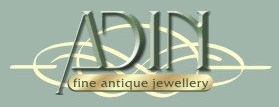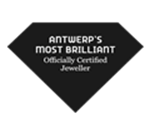Nu gespreide betaling mogelijk op het juweel van uw dromen! Vraag ons naar de details. Gratis verzekerde verzending van alle orders!
Pearl of the Past: A Diamond-Encircled 1930 Engagement Ring
A splendid example of Art Deco craftsmanship, this platinum engagement ring from around 1930 harmoniously blends tradition and modernity. Thirteen old European cut diamonds form a radiant halo around a grand pearl, each gemstone contributing to the ring's overall luminescence. The intricate design features swirls that evoke a sense of joy and elegance, while the pearl's rainbow glaze adds a touch of mystique. Perfectly capturing the transition from Art Deco to the Interbellum period, this ring is a testament to the era's fascination with geometric forms and the enduring allure of fine jewellery.
Antique jewelry object group: ring
Condition: excellent condition
- (more info on our condition scale)
Country of origin:
unknown
Style:
Between Art Deco and Interbellum - Art Deco is an eclectic artistic and design style which had its origins in Paris in the first decades of the 20th century. The style originated in the 1920s and continued to be employed until after World War II. The
term "art deco" first saw wide use after an exhibition in 1966, referring to the 1925 Exposition Internationale des Arts Décoratifs et Industriels Modernes that was the culmination of high-end style modern in Paris. Led by the best designers in
the decorative arts such as fashion, and interior design, Art Deco affected all areas of design throughout the 1920s and 1930s, including architecture and industrial design, as well as the visual arts such as painting, the graphic arts and film. At the
time, this style was seen as elegant, glamorous, functional and modern. The interwar period (1918–1939) is understood, within recent Western culture, to be the period between the end of the First World War and the beginning of the Second World War. This
is also called the period between the wars or interbellum.
- See also: Art Deco
and Interbellum
or more info on styles
Style specifics: This is something between Art Deco and the Interbellum.
Abstract motives and geometrical forms are quite typical for the Art Deco period. Art Deco moved away from the soft pastels and organic forms of its style predecessor, Art Nouveau, and embraced influences from many different styles and movements of the
early 20th century, including Neoclassical, Constructivism, Cubism, Modernism, and Futurism. Its popularity peaked in Europe during the Roaring Twenties and continued strongly in the United States through the 1930s. Although many design movements have
political or philosophical roots or intentions, Art Deco was purely decorative.
The Interbellum
is the period between the two World Wars and one can recognize a transition from the Art Deco style
to the Retro style.
Period: ca. 1930
- (events & facts of this era, poetry of this era,
fashion of this era)
Material: platinum
- (more info on precious metals)
Extra information:
engagement ring
- Especially in Western cultures, an engagement ring is a ring indicating the that the person wearing it is engaged to be married. In the United Kingdom, and North America, engagement rings are traditionally worn only by women, and rings can feature
gemstones. In other cultures men and women usually wear matching rings, which can be plain. In some cultures, engagement rings are also used as wedding rings.
Conventionally, the woman's ring is presented as a betrothal gift by a man to his prospective spouse while he proposes marriage or directly after she accepts his marriage proposal. It represents a formal agreement to future marriage. Rings can be bought
by the man, the couple together, or by each partner for the other.
In North America and the United Kingdom, it is worn on the left hand ring finger, while in Poland and Ukraine, it is customary for the ring to be worn on the right hand. In Germany, the ring is worn on the left hand while engaged, but moved to the right
hand when married. Similar traditions purportedly date to classical times, dating back from an early usage reportedly referring to the fourth finger of the left hand as containing the vena amoris or "vein of love".
Betrothal rings were used during Roman times, but weren't generally revived in the Western world until the 13th century. The first well-documented use of a diamond ring to signify engagement was by the Archduke Maximilian of Austria in imperial court of
Vienna in 1477, upon his betrothal to Mary of Burgundy.
In the 20th century, if he could afford it, the typical Western groom privately selected and purchased an engagement ring, which he then presented to his desired bride when he proposed marriage. More recently, couples frequently select an engagement ring
together. (from Wikipedia)
Diamonds:
13 old European cut
diamonds with a total estimated weight of approx. 1.82 crt. (approximate color and clarity H/I vs/si)
Note: All diamond weights, color grades and clarity are approximate since the stones were not removed from their mounts to preserve the integrity of the setting.
Total diamond weight: approx. 1.82 crt.
Precious stones:
One pearl
- (more info on precious stones)
Birthstones:
Diamond is the birthstone (or month stone) for April
and pearl for June.
- (more info on birthstones)
Hallmarks: One hallmark "M" and another mark "P", we do not know what these marks stand for.
- (more info on hallmarks)
Dimensions: diameter of top of ring 1,63 cm (0,64 inch)
Weight: 5,10 gram (3,28 dwt)
Ring size Continental: 51 & 16¼ , Size US 5½ , Size UK: K½
Resizing: Free resizing, but because of the the way the ring is made, we cannot guarantee to make it on every size; so please ask in advance (only for extreme resizing we have to charge).
- (more info on ring sizes)
Reference Nº: 16046-0020
Copyright photography: Adin, fine antique jewelry
platinum jewelry,
jewelry with diamond,
jewelry with pearls,
latest acquisitions,
antique jewelry,
estate jewelry,
vintage jewelry or
modern jewelry
Jewelry with birthstones (or month stones) for:
January -
February -
March -
April -
May -
June -
July
August -
September -
October -
November or
December.
Additional information:
jewelry glossary -
wall of fame -
visit us in Antwerp -
subscribe to our mailinglist.
What is antique jewelry? -
What is estate jewelry? -
What is vintage jewelry?






















